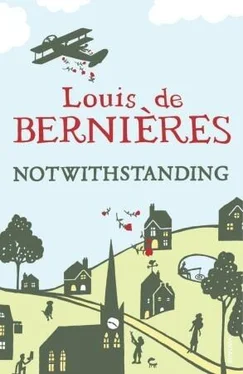Sir Edward Rawcutt occupied a late-Victorian Surrey farmhouse. It was substantial and imposing, with numerous low sag-roofed annexes attached to it at the back in a somewhat arbitrary fashion. Its croquet lawns were kept in immaculate condition by young Robert from the council houses, who often mowed with his pet rook resolutely perched upon his shoulder. He was paid five pounds a time, plus unlimited peanut butter sandwiches. The marvellous rose beds were tended by Lady Gemma Rawcutt herself, who was never without a pair of secateurs secreted somewhere about her person. She was a notoriously nimble-fingered and furtive snipper of cuttings from all the great gardens of southern England, from Great Dixter and Bateman’s to the Royal Horticultural Gardens at Wisley. There were many in the gardening club who dreaded her yearly visits to their own homes when it was their turn to act the host. So adept was her pilfering that she had never actually been caught, even though everyone knew that it was she who was responsible for their mutilated shrubs and bushes. She was, despite this almost unforgivable personality defect, well loved on account of her graceful figure, her crisp accent and her charmingly spontaneous peals of laughter. She was a regular member of the team of ladies who arranged flowers in the church by rota, and this also was taken into consideration as an extenuating circumstance.
Sir Edward himself was an affable and energetic gentleman approaching his middle sixties. His energetic and reckless youth had been followed by a raffish and adulterous middle age, and this in turn had recently been succeeded by the unexpected return of the simple piety that had been his most remarkable trait before the onset of adolescence. Conscious, no doubt, of the beat of death’s drum, he had taken to attending every possible communion in the village church, and was fond of comparing the relative merits of various sung Eucharists which he had attended in cathedrals as far apart as Wells and Peterborough. There were those who considered this preoccupation a harmless eccentricity, and others who felt a warm glow in their hearts at the thought of such a prodigal’s wholehearted return.
The Reverend Freemantle himself was unconcerned as to why Sir Edward had returned to the fold; if God moved in mysterious ways, it was clear that many others did also. What concerned the Rector was that he had not seen Sir Edward for some time, and the latter had not yet responded to his note asking him if he would read one of the lessons in a forthcoming service. He had a feeling that something must be wrong.
He was on the point of picking up the telephone when he was startled by an urgent knocking at the door. One of his predecessors had installed an enormous brass knocker in the shape of a lion’s head, and he had never ceased to be shocked when its percussions suddenly reverberated through the house.
He heard someone go to the door, and shortly afterwards his oldest daughter appeared, and said, ‘Daddy, there’s an old lady here to see you.’
‘Who is it?’
‘I don’t know, Daddy, she didn’t say.’
‘Oh well, you’d better send her in, then.’
‘She doesn’t want to come in, she says she’s in a hurry. She’s waiting at the door.’
‘Oh hell’s bells.’
‘Not a very godly attitude, Daddy.’
‘Oh drat, I suppose I’d better come out. Tell her I’m coming straight away.’
‘She’s a bit strange.’
‘Is she? Oh lor’; as if I didn’t have enough to worry about.’
The Rector put down his address book, stood up and stretched. He came out into the hallway and went to the front door, where he beheld an elderly woman dressed in black, who was anxiously rubbing her hands together and biting her lip. The Rector thought that she looked very familiar, but he was quite unable to put a name to her. His forgetfulness was one of the problems that he still had with this parish even though he had been there for nearly twenty years, and it caused him little pangs of shame from time to time. He always dreaded having to make introductions, and even had some difficulty with recollecting the names of some of the more mousy ladies of his Bible Study Group on Tuesdays, who were grimly but steadfastly reading their way right through the entire New English Bible, from the first word of Genesis to the last word of Revelation. They were at present reading with some horror of the numerous divinely inspired atrocities in the Book of Judges.
‘Do come in,’ he said, ‘it’s really quite cold out there. I think we might be in for some snow.’
‘I prefer to stay where I am,’ said the old lady, ‘if you don’t mind. I have something of great urgency to tell you, and I will require only a moment of your time.’ She spoke with precision, and some hauteur.
‘Oh dear,’ said the Rector, ‘has something dreadful happened?’
‘Not yet, sir, but I have to tell you that Sir Edward is very seriously ill and is in need of communion. You know how much comfort he derives from it. I must ask you to come as soon as you possibly can. He’s not long for this world, I am sorry to say.’
The Rector felt a pang in his heart; he was really very fond of Sir Edward, and the thought of him being at death’s door, or even very ill, was particularly painful. ‘Tell him I’ll come right away,’ he said.
‘Thank you, sir,’ said the old lady, ‘it will be very much appreciated by all of us, I do assure you.’
After she had gone, the Reverend Freemantle set about rummaging for all the things he would need for a private Eucharist. He would have to pick up some of it from the church vestry. He found his little leather case with its chalice, paten and cruet of wine, and then sat down at his desk and scrawled a list — Abbreviated order, Bible, prayer book, oil? Two small candles, matches, small crucifix, little table? White linen cloth? Purificator, chalice, host, water jug, stole .
He underlined the things that they would surely have at Sir Edward’s house, and decided that he would take his cassock and surplice, as the dying man was quite High Church by inclination. His daughter came in, and said, ‘Strange, wasn’t she?’
‘Strange? Who?’
‘That woman. She looked as if she dressed in stuff from a play. That lacy white collar thing, it was almost a ruff. And her hair all tied up like that, it must take hours. And that funny little hat with the silver-mounted claw. She actually had hatpins.’
‘She was all in black, wasn’t she? I thought she was just an old widow.’
‘Widows don’t wear black any more, Daddy. Honestly, where have you been all these years?’
‘Don’t they?’
‘No, Daddy, they don’t.’
‘Oh dear. Well, as you often like to point out, I am just an old fossil, aren’t I? I don’t really notice what people are wearing these days anyway. You get Polly Wantage in plus fours, and sometimes when you call in on the General, he’s not wearing anything at all, and you wear skirts hardly wider than a belt. Anyway, tell your mother I’ve had to go out. Sir Edward’s ill, and apparently it’s very bad.’
‘Oh how awful,’ she said, putting her hand to her mouth.
After an anxious search for his car keys that eventually involved the entire population of the house, he finally got into his maroon Singer Gazelle and drove up the hill to the church. He parked next to the disused lime kiln, retrieved the great key from the tomb of Piers de Mandeville, let himself into the church and raided the vestry. He realised that he was panting from the exertion of all this hurrying and worrying, and he started to sweat about the head. He crammed all he needed into a carpet bag, and strode back out to his car, harmlessly forgetting that he had left the key in the door of the church, where he would find it upon his return.
Читать дальше












